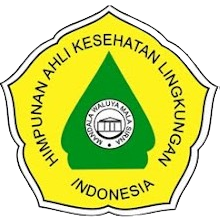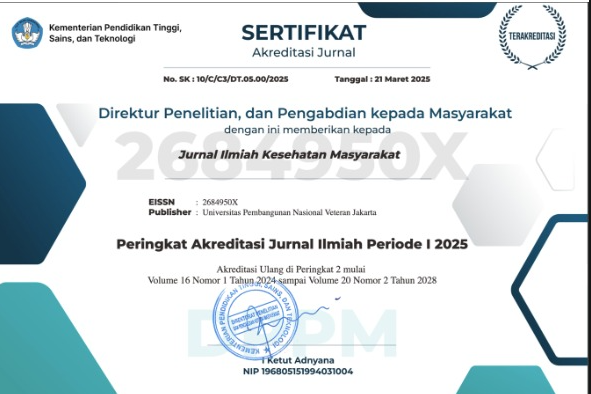Hubungan Kepatuhan Menjalani Kemoterapi dengan Kualitas Hidup Pasien Kanker Payudara di RSUD Dr. Moewardi Surakarta
Abstract
Abstrak
Latar belakang: Badan Kesehatan Dunia (WHO) melaporkan jumlah penderita kanker terus meningkat dari 1,4 juta menjadi 12,7 juta. Indonesia telah mengembangkan beberapa pengobatan untuk kanker payudara, salah satunya adalah kemoterapi, Pasien kanker yang menjalani kemoterapi memiliki berbagai dampak dan efek samping yang bisa menurunkan kualitas hidup. Tujuan penelitian ini untuk mengetahui determinan kualitas hidup pasien Kanker Payudara di RSUD Dr. Moewardi Surakarta.
Metode: Jenis penelitian analitik dengan pendekatan cross-sectional. Populasi penelitian ini yaitu seluruh penderita kanker payudara sedang menjalani kemoterapi di RSUD Dr. Moewardi Surakarta. Sampel yang digunakan sejumlah 27 responden. Teknik pengambilan sampel dengan accidental sampling. Analisis data menggunakan analisa Univariat dan Bivariat menggunakan ujiChi-square.
Hasil: Hasil penelitian menunjukan bahwapasien yang patuh menjalani kemoterapi menunjukan kualitas hidup yang baik (81,8%), sedangkan pasien yang Tidak patuh dalam menjalani kemoterapi menunjukan kualitas hidup yang buruk (80 %) nilai p= 0,017 ada hubungan Kepatuhan menjalani kemoterapi dengan kualitas hidup Pasien kanker payudara di RSUD Dr. Moewardi Surakarta.
Kesimpulan: Para pembuat kebijakan rumah sakit dapat memberikan edukasi psikologis secara rutin terkait pentingnya optimisme bagi pasien yang menjalani kemoterapi, serta diharapkan dokter, perawat, dan praktisi medis lainnya dapat memberikan dukungan agar pasien lebih optimis terhadap pemulihan dan meningkatkan kualitas hidupnya.
Relationship of Compliance Undergoing Chemotherap With Quality of Life of Ca Mammae Patients at Dr. Moewardi Hospital Surakarta
Abstract
Background: According to the World Health Organization (WHO), the number of cancer sufferers increased from 1.4 million to 12.7 million. Indonesia has developed several treatments for breast cancer, one of which is chemotherapy. Cancer patients undergoing chemotherapy have various effects and side effects that can degrade quality of life. This study aimed to determine the quality of life of Breast Cancer patients at Dr. Moewardi Surakarta Hospital.
Method: This study was a cross-sectional approach. The population in this study were all breast cancer patients who underwent chemotherapy at Dr. Moewardi Hospital Surakarta Hospital. The sample used was 27 respondents. The sampling technique uses accidental sampling. Data analysis used univariate and bivariate analysis using Chi-square test.
Results: Results showed that patients who adhered to chemotherapy showed good quality of life (81.8%), while patients who were not compliant in undergoing chemotherapy showed a poor quality of life (80%) p value = 0.017 α £ 0.05 there was a relationship between compliance underwent chemotherapy with the quality of life of Ca.Mamae patients at Dr. Moewardi Surakarta Hospital.
Conclusion: Hospital policymakers can provide regular psychological education on the importance of optimism for patients undergoing chemotherapy, and it is hoped that doctors, nurses and other medical practitioners can provide support to make patients more optimistic about recovery and improve their quality of life.
References
Kementerian Kesehatan Republik Indonesia. Infodatin Kanker Payudara. InfoDATIN. 2016. p. 1–3.
Wakhid A, Nurhikmah W, Rosalina. the Role of Mental Health Cadres in the Handling of Mental. J Ilmu Keperawatan. 2018;1(1):38–47.
Irawan E, Rahayuwati L, Yani DI, Keperawatan F, Keperawatan F, Padjadjaran U. Hubungan Penggunaan Terapi Modern dan Komplementer terhadap Kualitas Hidup Pasien Kanker Payudara Relationship between Modern and Complementary Therapies on the Life Quality of Breast Cancer Patients Undergoing Chemotherapy. J Nurs Padjadjaran. 2017;5(April):19–28.
Utami SS, Mustikasari M. Aspek Psikososial Pada Penderita Kanker Payudara: Studi Pendahuluan. J Keperawatan Indones. 2017;20(2):65–74.
Irawan E, Hayati S, Purwaningsih D. Hubungan Dukungan Keluarga Dengan Kualitas Hidup Penderita Kanker Payudara. J Keperawatan BSI. 2017;5(2):121–9.
Ii BAB. Universitas Sumatera Utara 6. 2001;1(2):6–38.
Wulandari N, Bahar H, Ismail C. Gambaran Kualitas Hidup Pada Penderita Kanker Payudara Di Rumah Sakit Umum Bahteramas Provinsi Sulawesi Tenggara Tahun 2017. J Ilm Mhs Kesehat Masy Unsyiah. 2017;2(6):183119.
Monterroso S. No Title空間像再生型立体映像の 研究動向. Nhk技研. 2015;151(2013):10–7.
Park JH, Lee J, Oh M, Park H, Chae J, Kim D Il, et al. The effect of oncologists’ exercise recommendations on the level of exercise and quality of life in survivors of breast and colorectal cancer: A randomized controlled trial. Cancer. 2015;121(16):2740–8.
Purwanti F. Developmental and Clinical Psychology. Identitas Diri Remaja Pada Siswa Kelas Xi Sma Negeri 2 Pemalang Ditinjau Dari Jenis Kelamin. 2013;1(1):21–7.
Rustam DB. FAKTOR FAKTOR DETERMINANYANG BERPENGARUH PADA KUALITAS HIDUP WANITA PENDERITA KANKER PAYUDARA DI RSUD Dr. MOEWARDI. 2017;
Abraham J, Puteri MA. Sexual Self-schema, Perceptions of Breast Talk, and Physical Self-concept in Breast Cancer Survivor. Int J Public Heal Sci. 2015;4(2):131.
Chow, K. M., Hung, K. L., & Yeung, S. M. (2016). Body image and quality of life among breast cancer survivors: a literature review. World J Oncol Res, 3, 12-20.
Tsitsis, N., & Lavdaniti, M. (2014). Quality of Life in Women with Breast Cancer. International Journal of Caring Sciences,.
Wulandari, W. D. (2004). Penentuan validitas whoqol-100: dalam menilai kualitas hidup pasien rawat jalan di rscm (versi Indonesia).









.jpg)








